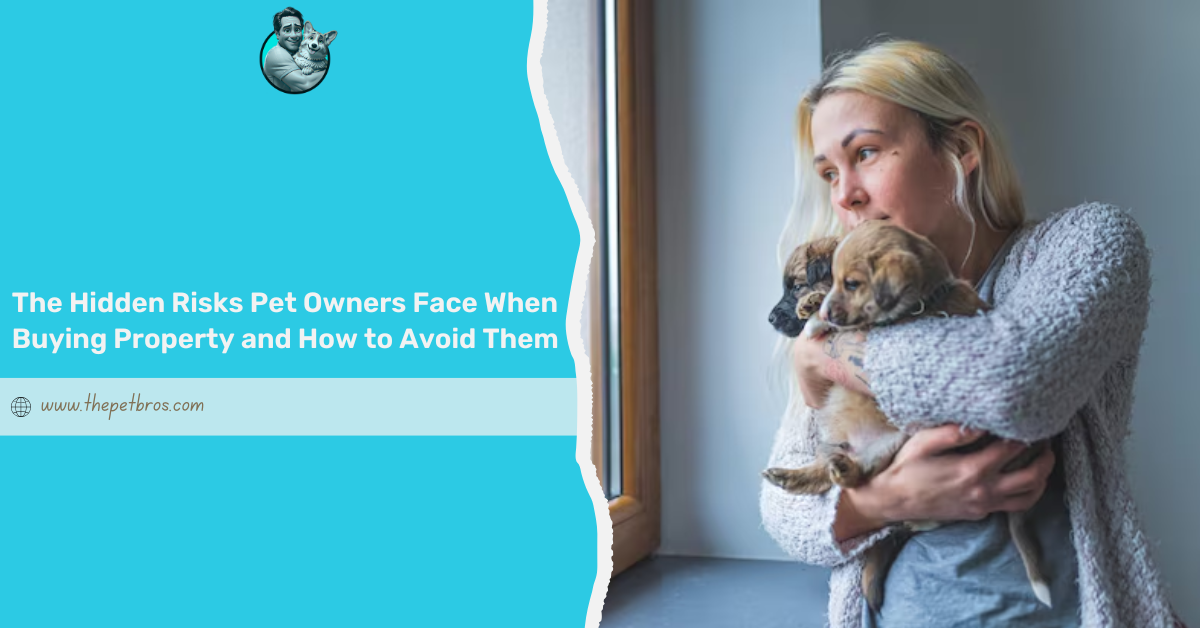For many of us, pets aren’t just animals, they’re family. So, when you’re making one of life’s biggest financial decisions – buying property – your pet’s comfort, safety, and long-term wellbeing should be part of the plan. Yet, this is where many buyers fall short. The risks pet owners face when buying property goes beyond noisy neighbours or small yards. Zoning bylaws and long-term pet health needs two other very important risks that must be considered, and ignoring these details can lead to stressful and expensive mistakes.
In this article, we will walk through the hidden risks pet owners face and how to avoid them, especially if you’re investing in property.
First, Not All Homes Are Homes Are Suitable for Pets
As a pet owner, you must understand that not all homes are pet homes. Unfortunately, many new homeowners realise this only after the papers are signed. A dog might struggle with stairs in a third-floor apartment. cat might be stressed by nearby traffic and lack of sunlight. And if the community doesn’t allow pets? You could find yourself in legal trouble or forced to move!
According to the World Animal Foundation, about 57% of households own a pet with 49% of them considering pet as a part of their family. And globally, this number continues to rise as pet ownership becomes more mainstream. Yet, many property listings still don’t prioritize pet-related details.
So, What Makes a Property Pet-Unfriendly?
In an interview with the Washington Post, one pet owner shared that her 15-year-old dog struggled with stairs in their apartment, and that moving to a home with a backyard became necessary. “It’s much easier to be in a house where I can open the door and let her out,” she said.
That’s just one example. Below are a few more subtle risks pet owners face when buying property:
- Noise Ordinances & Fines: In the UK, under the Environmental Protection Act 1990, dog owners can be fined up to £5,000 when their dogs bark excessively. In May 2025, a woman in Rhondda was fined over £1,500 for repeatedly ignoring warnings to control her dogs’ barking. The council had received 225 noise recordings over a three-month period, documenting continuous barking. Despite being served with an Abatement Notice, she failed to address the issue, leading to prosecution and a fine of £1,535.27.
- Zoning Rules: Depending on where you live, zoning laws may limit the number or type of pets allowed in residential buildings. Condos, in particular, have strict rules on pet size, breed, and noise levels. The Alberta Real Estate Association explains that buyers must often get written board approval for pets and this approval can be revoked.
- Long-Term Access Issues: Stairs and tight hallways might seem manageable now, but senior pets will eventually need flat access or open yard space. Because climbing stairs might become tedious.
- Lack of Open Space: Another risk pet owners face are homes without fenced yards or nearby walking trails. This can lead to restlessness, aggression, or poor pet health. And unfortunately, many listings only mention “square footage” without specifying how that space supports pet-friendly living.
Pet-Friendly Laws Vary Widely
One of the most overlooked risks pet owners face when buying property is not researching local rules. And this is not only contextual to the United Kingdom. Each country, city, or even housing community has its own policies, some lenient, others strict. These can affect:
- The number of pets allowed
- Size or breed restrictions
- Outdoor access rules
- Waste disposal and maintenance requirements
- Whether fencing is required or restricted
For example, in parts of the US and Canada, noise complaints can result in pet bans or fines. In other countries, like Nigeria and other West African countries, pet restrictions are often less documented but still enforced through estate covenants or community codes.
5 Ways to Avoid Risks Pet Owners Face
You don’t need to give up on your dream home but you do need to go in prepared. Here’s how:
- Ask the Right Questions Upfront: Don’t assume. Ask the seller, agent, or property manager about pet rules, nearby parks, noise regulations, and fencing policies.
- Research Municipal and HOA Rules: Use city planning websites or legal consults to verify zoning codes, pet ordinances, and breed bans. Always double-check, especially for condos or gated communities.
- Inspect for Pet Safety: Look beyond the aesthetics. Check if fences are intact, if flooring is pet-friendly, and whether the space accommodates feeding areas, litter boxes, or crates.
- Plan for the Future: Puppies grow. Cats need quiet corners. Elderly pets may need ramps or easier access. Buy with their entire life in mind, not just your current phase.
- Speak to Other Pet Owners in the Area: Neighbours often know more than listings. Ask them how the community treats pets, what issues they’ve faced, or what they love the most.
A Word on International Buyers
If you’re a diaspora buyer planning to invest in real estate back home, be extra cautious. Buying land or property remotely already comes with risks from title fraud to poor construction quality. Now imagine buying a home that also doesn’t support your lifestyle or pet ownership plans.
That’s why working with reputable real estate professionals is key. Get an agent who understands both the local market and your lifestyle needs. And as always, combine your emotional goals with legal due diligence.
Conclusion
The risks pet owners face when buying property is real but it’s avoidable. With proper research, thoughtful planning, and the right team by your side, you can buy a home that’s safe and supportive for both you and your pets. Don’t rush the process, and don’t leave your pet’s needs as an afterthought. In the end, a happy pet makes for a happy home.
Frequently Asked Questions
Can my homeowners’ association (HOA) ban pets even after I buy them?
Yes. Many HOAs or condo boards require pet approval, and that approval can be conditional or revoked, especially if your pet violates noise or size rules.
Should I avoid buying an apartment if I have a dog?
Not necessarily but make sure it’s on the ground floor or has access to open space. Apartments with elevators, balconies, and nearby walking routes are best for dogs.
Are there pet-friendly property listings online?
Yes. Some platforms allow you to filter by “pet-friendly,” but it’s always better to call the agent and ask specific questions.
I’m buying property remotely. How do I ensure it’s pet-friendly?
Work with a trusted local agent who can inspect the property for pet features like fencing, floor type, and neighbourhood friendliness and send you detailed reports or videos.







